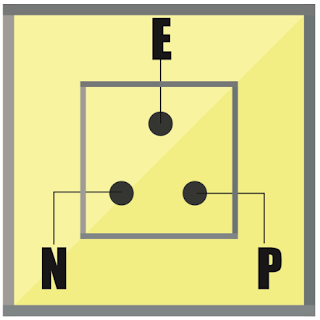When you call an electrician what does he check? How does he identify
faults in your electricity
supply lines? Do you have clear understanding of the Phase, Neutral and
Earth points in the sockets of your house?
Well, we are not trying to teach you Electrical Engineering. As a
consumer, it is smart to be aware of the electricity distribution
from Power Plant to your house. It is also important to understand the Phase –
Neutral – Earth points and what is their importance.
Let us first understand the basic of domestic electricity supply chain.
Domestic electricity supply can be broadly divided into three categories:
1. Generation
2. Transmission
3. Distribution
TRANSMISSION: Generated power
is stepped up for ease of transmission. Power is transmitted via DELTA
connection, (a Delta connections needs only 3 wires R-Y-B).
DISTRIBUTION:
From the transmission lines the power is stepped down through local transformers
and from the local transformer connection is distributed to individual houses.
From the local
transformers power is distributed to different houses as STAR connection
which is having 4 wires. Three Phase wires and one Neutral wire. The Neutral
point in the transformer is connected to the ground.
For domestic connections, the Neutral point is common, and any one
phase (R, Y or B) is given as line to individual houses.
Understanding the Socket
Point P should always have power, this can be checked by a Tester. The
N point has no power in it, it cannot be checked with a Tester. To check the N
point, a test lamp should be used.
What is the
difference between Earth and Neutral?
Neutral is connected to the Neutral point of your local distribution
transformer.
The Earth point is unique, made for your house only.
Why Earthing is important?
If earthing is not done, there will be chances of electrical shock
in case there is some fault in the circuit.
No risk of electric shock if Earthing is done even if there is a fault
in the circuit.
Mahindra Powerol deals in robust and fuel-efficient diesel and gas
gensets ranging from 5kVA to 625 kVA. To know more about our products visit us
at www.mahindrapowerol.com or call us at 1800-419-1999











No comments:
Post a Comment